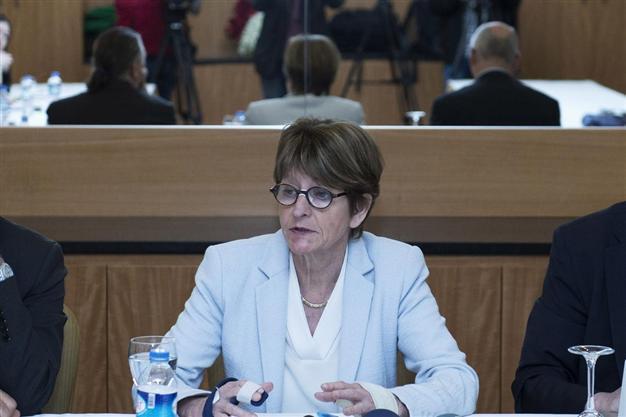Venice Commission to look at shortcomings in Turkey’s domestic security package: PACE President
Sevil Erkuş - sevil.erkus@hurriyet.com.tr ANKARA

PACE President Anne Brasseu speaks during a press conference in Ankara on April 9. AA Photo
Turkey’s controversial new domestic security package “is unacceptable,” Parliamentary Assembly of the Council of Europe (PACE) President Anne Brasseur has said, adding that the Venice Commission plans to examine the law in detail after Turkey’s upcoming election.“If you use all those restrictive measures taken by individual countries and put them together then you get the new law here in Turkey. They have taken the most restrictive practices,” Brasseur said on April 9, speaking at a meeting with a group of journalists from the Diplomacy Correspondents Association (DMD).
The protection of a country for its national security “cannot go as far as limiting all words of freedoms. There is a very big danger,” she said, elaborating on her discussions with Turkish officials including President Recep Tayyip Erdoğan.
“In the election period and after elections we have to look at that law. The Council of Europe has the Venice Commission as an instrument to monitor legislation. For the security package, Turkey did not ask for the opinion of the Venice Commission, but I think that we have to look deeper into it. We must maintain fundamental freedoms,” Brasseur stated, adding that she had also discussed a number of other shortcomings in Turkey such as freedom of the media and incomplete implementation of ECHR rulings.
Describing the 10 percent electoral threshold as “too high,” Brasseur said she felt that the ruling Justice and Development Party (AKP) “does not want to change it, although the Council of Europe has requested it a number of times.”
The PACE president said coalition governments worked efficiently in many countries, and a similar government could emerge if the Peoples’ Democratic Party (HDP) is able to pass the 10 percent threshold.
“If the HDP passes the threshold then the ruling party will not have an absolute majority. There may therefore be a coalition. I have tried to find out what are the ‘no go’ areas between parties, but I haven’t got a clear answer ... It all depends on the 10 percent threshold. It can be good for a country to have a coalition,” she said.
Brasseur said a pre-election team from PACE will visit Turkey for observation in early May, and a bigger team will observe the June 7 elections not only in big cities but also in remote areas.
Meanwhile, she also addressed Turkey’s patchy implementation of ECHR rulings, saying that parliaments should have special committees to control implementation of ECHR decisions.
“Turkey is not really in the best class on this issue. Parliaments should check these things,” Brasseur noted.
Elaborating on a recent ban on social media and the Turkish government’s harsh criticism of media outlets for publishing a photo of an Istanbul prosecutor taken hostage last month, Brasseur said media should be “responsible” and there must be protection for the prosecutor’s privacy. However, she stressed that political parties must find a way to deal with such cases without resorting to bans, and a blanket ban on social media cannot be a solution in the long term.
















